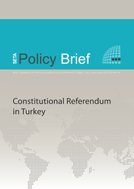Since the establishment of the Turkish Republic, four constitutions have been adopted (1921, 1924, 1961, and 1982), which were significantly amended by the successive parliaments in light of new developments, yet remained short of meeting universal democratic standards. The last two constitutions were drafted in the aftermath of military interventions, and none of them have been produced out of negotiation, bargaining or a compromise process. Within the framework of the EU reforms, Turkey’s most recent constitution of 1982 has been amended several times – so much so that almost one third of the constitution has been reconstructed. There have been demands for the drawing up of a new constitution from both right and left wing parties, but the idea has never been realized.
On March 22, 2010, the AK Party announced a constitutional reform package which the Turkish parliament approved the bill to reform the constitution on May 7, 2010. The Turkish public will vote on the whole package on September 12, 2010; the date of the referendum has a symbolic meaning, as the current constitution is the product of the coup d’état of September 12, 1980.
***
Since the establishment of the Turkish Republic, four constitutions have been adopted (1921, 1924, 1961, and 1982), which were significantly amended by the successive parliaments in light of new developments, yet remained short of meeting universal demo¬cratic standards. The last two constitutions were drafted in the aftermath of military interventions, and none of them have been produced out of negotiation, bargaining or a compromise process. Within the framework of the EU reforms, Turkey’s most recent constitution of 1982 has been amended several times – so much so that almost one third of the constitution has been reconstructed. There have been demands for the drawing up of a new constitution from both right and left wing parties, but the idea has never been realized.
Prior to the last general election held on July 22, 2007, Turkey’s ruling party, the Justice and Development Party (AK Party), declared that it would found a new, civilian and democratic constitution during its second term. In the time leading up to the elections, Prime Minister Recep T. Erdoğan assembled a committee headed by Professor Ergun Özbudun, a prominent constitutional lawyer in Turkey to oversee the drafting of a new civilian and democratic constitution within the parameters of the party’s election manifesto. The committee, which was composed of liberal-minded constitutional lawyers and political scientists, completed the draft text within the relatively short period of two and a half months. The draft constitution was submitted to the special commission set up by the AK Party on August 19, 2007 for evaluation. A joint meeting between the drafting committee members and leading AK Party ministers and parliamentarians took place on September 14-16 where some minor modifications were made.
However, before it was made public, the draft was leaked to the media, where it aroused strict opposition even though the draft constitution was more democratic and liberal than the present Turkish Constitution. Turkey’s military-civilian bureaucracy accused the initiative of being a step toward dismantling the secular regime. The AK Party de nied the accusations and claimed that the new constitution was a key component of the democratization process within the framework of Turkey’s pursuit of EU member¬ship. As a result of heated debates, the constitution project was put on hold in early 2008. Instead of pursuing a full revamping, the AK party and the National










